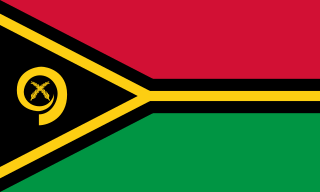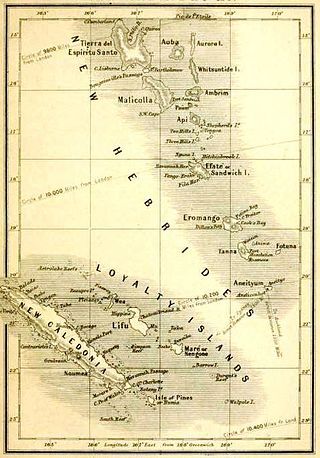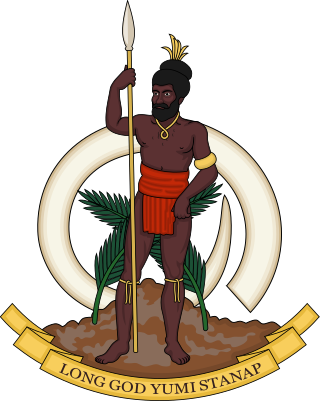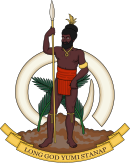
Vanuatu, officially the Republic of Vanuatu, is an island country in Melanesia, located in the South Pacific Ocean. The archipelago, which is of volcanic origin, is 1,750 km (1,090 mi) east of northern Australia, 540 km (340 mi) northeast of New Caledonia, east of New Guinea, southeast of Solomon Islands, and west of Fiji.

The history of Vanuatu spans over 3,200 years.

Walter Hadye Lin̄i was a Raga Anglican priest and politician who was the first Prime Minister of Vanuatu, from independence in 1980 to 1991. He was born at Agatoa village, Pentecost Island. On his mother's side, he was a descendant of the high chief Virasangvulu, while on his father's side, he was descended from the famous weaver, Nuenue, as well as from the high chief Viralalau.

General elections were held in Fiji between 26 September and 8 October 1966, the last before independence in 1970 and the first held under universal suffrage. The result was a victory for the Alliance Party, which won 23 of the 34 elected seats. Its leader Kamisese Mara became the country's first Chief Minister the following year.

Nagriamel is a political party in Vanuatu.

General elections were held in Papua New Guinea between 18 June and 9 July 1977, the first since independence from Australia in 1975. The Pangu Party led by Prime Minister Michael Somare emerged as the largest in the National Parliament. Somare subsequently formed a coalition government with the People's Progress Party (PPP) and several independent MPs. Voter turnout was 60.3%.
The Baháʼí Faith in New Caledonia was first mentioned by ʻAbdu'l-Bahá in 1916, though the first Baháʼí arrived in 1952 during a temporary visit because of restrictive policies on English-speaking visitors. In 1961 Jeannette Outhey was the first New Caledonian to join the religion. On the same year, Emma and Georges Wayenece were the first melanesian couple to accept the Faith of Baha'u'llah. With other converts and pioneers, they elected the first Baháʼí Local Spiritual Assembly of Nouméa in 1962. The Baháʼí National Spiritual Assembly of New Caledonia was elected in 1977. Multiplying its involvements through to today, the 2001 population was reported at 1,070. The Association of Religion Data Archives estimated some 955 Baháʼís in 2005.

Early general elections were held in the New Hebrides on 29 November 1977 following the dissolution of the Representative Assembly elected in 1975 due to the Vanua'aku Pati blocking its work in order to protest the inclusion of members elected by the Chamber of Commerce.

General elections were held in the New Hebrides on 14 November 1979 for the seats in Representative Assembly, the last before independence the following year. The result was a victory for the Vanua'aku Pati, which won 25 of the 39 seats, with its partner party Natui Tanno winning one. Voter turnout was 90.3%.

General elections were held in the Solomon Islands on 22 June 1976. Although contested by three political parties, the Independent Group emerged as the largest group in the Legislative Assembly, and elected Peter Kenilorea Chief Minister.

General elections were held in Western Samoa on 24 February 1979. Voting was restricted to matai and citizens of European origin, with the Matai electing 45 MPs and Europeans two. Although all candidates ran as independents, an opposition bloc had emerged following the 1976 election of Tupuola Efi as Prime Minister in Parliament.

General elections were held in the Solomon Islands between 22 May and 12 June 1973. The following year, Solomon Mamaloni of the People's Progressive Party became the first Chief Minister.

General elections were held in the Territory of Papua and New Guinea between 19 February and 11 March 1972. They saw the election of the country's first female MP, Josephine Abaijah.
Legislative elections were held in New Caledonia on 8 February 1953.
Legislative elections were held in New Caledonia on 11 September 1977. Anti-autonomy parties won 19 of the 35 seats.

Alexis Yolou was a New Hebridean politician. He was elected to the Representative Assembly in 1979 from the Tanna constituency, but was killed the following year as part of the civil strife on Tanna that resulted from the landslide victory of the Vanua'aku Pati.
Early legislative elections were held in New Caledonia on 29 September 1985. They were called after the 1984 elections had been boycotted by the pro-independence Kanak and Socialist National Liberation Front (FLNKS) and were marred by violence that continued for several weeks after election day.
Mary Laufa Gilu is a Vanuatuan former politician. She and Tessa Fowler were the first women elected to the Representative Assembly, serving from 1975 to 1977.
Tessa Fowler is a Vanuatuan former politician. She and Mary Gilu were the first women elected to the Representative Assembly, serving from 1975 to 1977.










